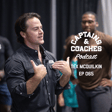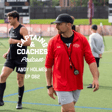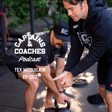Efficiency in Athletic Training
00:00:00
Speaker
300-pound bench press is great, yeah but if I can't hold a posture or a positioning, then I'm screwed. So then we started to just revamp everything. How can I get this to to protect posture and position through accentuating eccentric work?
00:00:16
Speaker
And that's really, from there, that allowed the further that something displaced away from ideal, the greater cost of energy it was going to be.
00:00:28
Speaker
And so for me, I said, I want to be more efficient. So if I can write quote unquote, the wrong quicker, I can create a more efficient
Introduction to the Podcast
00:00:37
Speaker
athlete. Welcome to the Captains and Coaches podcast. We explore the art and the science of leadership through the lens of athletics and beyond. beyond i'm your host Tex McQuilkin and today we are back in Tampa Bay for part two of the interview with Rafael Ruiz.
00:00:51
Speaker
If you have not, I highly encourage you to listen to part one with this master strength and conditioning coach and we dive into his origin story and then where I connected and met him to go all in and learn from him as an apprentice. Part two.
00:01:06
Speaker
I bust out my notebook from that experience. I go through this once a year and just aim to see if there's more lessons that I can pull out. Now, I'm 11 years later.
00:01:16
Speaker
ah decided to take this practice to him. So i go through a first couple of days of the notebook and ask, what were we thinking here? What was going on? And see if we can dive a little bit deeper live on the podcast. So awesome experience. This one dives a little bit more into the strength and conditioning, but also the neuroscience and then the the mindset and science behind accelerated skill acquisition.
00:01:44
Speaker
Raf's the best in the world at that. By far my favorite part of this, I share a day in the life from my apprenticeship from 5 a.m.
Coaching Scars and Trust Issues
00:01:52
Speaker
pre-sunup all the way to beyond sundown.
00:01:56
Speaker
every day for four months and what that experience entailed. So if you haven't caught it, check out part one. Part two, we hit the ground running and now let's hand it off to Raf to help us raise the game. Ready, ready and break.
00:02:10
Speaker
What do you feel the term coaching scars means to you when you hear Coaching what? Scars.
00:02:20
Speaker
Like my scars or scars that I call somebody else? Well, because that's a the the reason that they and they would hold on to Coach Raph's an asshole.
00:02:32
Speaker
Or when you're working with professionals or teenagers or college kids that come in and then they're still holding on to what a coach said that then now they they project onto Coach Raph. Oh, 100%. When I at that, if...
00:02:47
Speaker
but when when i look at that if The human mind is amazing at efficiency and and it's so much easier to not look in the mirror.
00:02:59
Speaker
And if they can project that on me, then they're going to take that easy route. And we can create so many scars from that just by doing that. yeah I mean, you have one You can cause huge scars by just blatantly mistrust.
Growth Through Discomfort
00:03:15
Speaker
When all of a sudden somebody looks at me as liable for an injury that they caused, or I'm liable because I got them to bench press more, but they got their butt handed to them on the field.
00:03:26
Speaker
Like those are all things that you could immediately erode trust. um There could be improprieties. there could be You can make some bad ethical decisions that cause a lot of scarring to occur.
00:03:38
Speaker
um and And those are all things that we all have to live with. But at some point in time, the mentoring of that needs to occur. If not, um again, we could go back to my old UT days where I have athletes that go, I've never done a dead bug in my life.
00:03:55
Speaker
And that's because I created athletes who would just sit there and listen, but wouldn't make decisions on their own to do it. Hey, that's a great job with this exercise. If you want to do it better, if you want to improve yourself, if you want to level up, I hear all of these coaching cues that the that the coaches use on the field.
00:04:18
Speaker
Well, I try to do the same thing. I listen to those and I try to bring them in the weight room. So, I'll hear somebody go, hey, level up. And then well I'll bring it into the weight room and I'll say, hey, if you want to level up, choose to do it this way. Hey, your knee is a little bit bent.
00:04:35
Speaker
If you want to level up, try to get a little bit straighter because that'll lead to maybe you not getting thrown out trying to steal seconds. Oh, okay, coach. And then they make that harder choice and then it hurts. But coach, it hurts.
00:04:49
Speaker
Awesome. and And it's one of those things that I... It's this weird tiptoeing balance where Zia's running and she falls. The normal person will run over and go, oh my God, my God, are you okay? And pick her up.
00:05:05
Speaker
What I do now, safe. And that's what I say and she'll go, yeah. And and you know she's bleeding and there's abrasions. And I go, safe, you did it girl. And I'll pick her up and I'm like, you won, you won.
00:05:19
Speaker
And then so now all of a sudden she does it. So she'll run over and she'll go, look at this boo-boo I got, dad. And I'm like, great job girl. And so just changing that culture of how they approach Discomfort nowadays they i mean half of these kids if they get hurt. It's the end of the world.
00:05:35
Speaker
I'm going home. I'm done I'm like, oh, okay. Well, you smashed your finger on the dumbbell rack. Okay, let go keep going. They know that they'll call their mom. They'll text and then they'll eat Because somewhere down the road we've failed them into mentoring that discomfort is okay.
00:05:55
Speaker
It's okay. we You need that. And to the point where not only is it okay, but you have to
Skill Acquisition in Sports
00:06:01
Speaker
crave it. You have to want it and when you talk about developing that sense of urgency, that is a magic formula that a lot of athletes don't understand at this age.
00:06:10
Speaker
is to say it's not enough to say it's okay, you have to want to eat it. You have to choose to swallow that jagged pill. And if you don't, then then you're never gonna get above a B. It's never gonna happen. You're always gonna be like, hey, I'm here average.
00:06:28
Speaker
I might do pretty good here, but you're never gonna do anything magical. And in order to do something magical, you really have to to go, the more discomfort I eat, the more magic I have become.
00:06:40
Speaker
And if you don't do that, I'm always going to be right here. Yeah. So... Yeah, that that's in line with the challenge. I was stepping into this this private school where the seniors, they had a certain way for a long period of time, and then I was aiming and challenging them, because just watching them get creative and play, I'm like...
00:07:01
Speaker
Dude, we got some guys that know ball. And then now all of a sudden when discipline enters the into the picture, and then I i frame discipline not as as punishment.
00:07:12
Speaker
It's it's ah giving you tools to make responsible decisions on and off the field. That's how I would define discipline versus pressing my thumb down on these dudes.
00:07:22
Speaker
And then the Ultimately, the response for a handful was they didn't want to try anymore, because if they try, then they fail. So why try?
00:07:34
Speaker
And that that was heartbreaking for me. And then aiming to try to find ways to communicate, like, this is the rest of your life, dude. Yeah. It is so hard. to do it Yeah, it was not lacrosse. This the rest of your life, man. So when Raider started this journey,
00:07:52
Speaker
When you look at developing infielders, we had a long talk about developing middle infielders and fielding ground balls. There's a level one that occurs where just stop the ball. You stop the ball and then you pick the ball up and you look for your target and you throw.
00:08:07
Speaker
And then it goes to level two where the guys go, hey, I'm going to feel the ball, get into my presentation and throw. Level three, most people never get there. And we talk about there's not a lot of guys who are true shortstops.
00:08:21
Speaker
Well, that level three is guys field and throw. It just becomes one motion. That's a very difficult thing. Well, the guys who play at the higher level are the guys who the game is so fast against guys like a Chandler Simpson who are running sub four to get to first base.
00:08:41
Speaker
The only play that you have is to run and attack the ball, get it on the run and try to throw them out. most people will not do that because number one is they don't want the ball to get past them.
00:08:54
Speaker
They don't want to error. They don't want the only play that can be possibly made to get that guy is for you to attack the ball.
Creativity and Decision-making
00:09:04
Speaker
When Raider started this journey, that was an unbelievably difficult thing to teach him because Raider was so afraid of failure. He was afraid of not letting the ball get past him. I don't want to let the ball get past me.
00:09:19
Speaker
And it wasn't until going to Trotsky's, it wasn't until talking to high-level guys that they would say, Raider, and we would play wall ball. So he would go and he would try and we would say, hey, he would make a play back here and he would stop the ball and he would throw and we would give him zero points.
00:09:36
Speaker
And we would say zero, but i but I stopped the ball, but I made the throw. I threw it into the bullseye. Zero, because that guy was safe. yeah And so all of a sudden we started to to label and we started to say, okay, you get the ball out in front, get it out early.
00:09:53
Speaker
That's a point. You get the ball out in front early at that cone, that's five points. And next thing you know, he's sitting there and and just by saying, running up there, and it even if he misses it,
00:10:07
Speaker
Great job! That's the right decision. You made the right decision to go get that ball. The only play that you could have made was the one you chose to do.
00:10:17
Speaker
And so that literally took months, months and months of just ingraining it, ingraining it over and over. Great job, great job. But I missed it, Dad. Who cares?
00:10:28
Speaker
Great job, great job. And so now he's at a point where he's boom, boom, boom, and he's making that play. And the... At 13, he's ha... At 12 and 13, he was having trouble because he would run up, and he wasn't strong enough to make those throws.
00:10:45
Speaker
Now, at 13 and 14, he's been doing it. He's bigger, faster, stronger, and now he's making those throws. And so now he goes... the process. So now all of a sudden it was like, oh, okay, I'm okay with this.
00:10:59
Speaker
I'm okay sucking at this because when I'm 15, I'll be making these plays. When I'm 18, I'll be making these
Leadership and Followership in Teams
00:11:07
Speaker
plays. When I'm 24, hopefully I'm making the plays that I watched last night.
00:11:11
Speaker
Yeah, I love it. good Gamification, you're rewarding the decision, not the outcome. Like, that's a beautiful analogy. And how how can you not feel romantic about baseball, right? Absolutely.
00:11:23
Speaker
Yeah, that... I'm starting to think ways to communicate that through lacrosse speak. and wait Here's something interesting. I had the opportunity to speak with one of the top professional lacrosse players, Jack Hanna.
00:11:36
Speaker
So he plays indoor, outdoor, incredibly creative athlete on the field and beauty of lacrosse, it's free flowing. and So you get the opportunity to just be a dude. So he also owns a facility in Denver, lacrosse den. And one thing he's communicated challenging is when he gets new kids in there that are afraid to fail, they're also looking to him for what to do.
00:11:59
Speaker
So now the the challenge, we had a great conversation about this where club ball, travel ball is entered into the sport of lacrosse where it's not development, they're just playing games.
00:12:11
Speaker
Maybe I get five runs in the game, I'm not getting 50 reps that I would at practice kind of thing. So it's almost setting the sport back. And then also during these summer games, the coach gets a pressure because they're a club coach, they're getting paid a check.
00:12:26
Speaker
They have to win. So now they're literally from the sideline, call it joy sticking. I'm saying, all right, Raider, you're going to cut. Zia now set a pick. I'm telling them exactly what to do versus correct teaching them the principles of ah a two man game or flow of offense.
00:12:42
Speaker
So now, within respect to the challenges he's facing, he's he's trying different games and tricks to just get these guys to understand principles.
00:12:54
Speaker
So now, what we did this morning, you were almost just set us up and set us free. We had a great demo with Coach Steph, and then we did our best to to execute the demo and then set us free.
00:13:09
Speaker
So with in line with movement principles, ah agnostic of sport, how can you help influence this athletic creativity in line with, hey, just moving, creating a sense of urgency, and and let's let's have some fun out there, because we are getting better.
00:13:26
Speaker
That's it. It's it's literally...
00:13:30
Speaker
When we teach a skill, we're really good at ah compartmentalizing that skill. Like, okay, here's a crossover step. Great. So we had that issue with this last group.
00:13:42
Speaker
Here's a crossover step. We're going to work on it for two days now. Crossover, pull with the instep, set up your athletic position. And so we do a good job of teaching it one, one step. That's all I need to see, one step. That's all i want to see.
00:13:55
Speaker
Well, then the moment I said, okay, now we're going to go run a short shuttle. And I purposely don't say anything because I want to see what sticks. Well, first athlete goes, great crossover to start.
00:14:08
Speaker
And then it just turned into poo-poo garbage. And I was just like, hey, what should that one look like? And he was like, I don't know. And I go, should it look like your crossover? He goes, yeah. And I go, well, what about when you change directions there?
00:14:21
Speaker
Yeah. Yeah. Okay. I got what you're saying. And so in those instances, um there is a certain state dependent learning. um One of the things that I, that I've watched with these, with these baseball practices, all over these, all over the place of all these different teams is,
00:14:39
Speaker
We'll go through something as simple as cuts. Hey, know where your cutoffs are. And so these coaches will practice it to nauseam. We're going to work on cutoffs, guys. Cutoffs, cutoffs, cutoffs. Know where your cutoffs are.
00:14:51
Speaker
And then they go, they get so angry because the kids can't do it in a game. Yeah. Because there's no intermediate in there. There needs to be a situation that a lot, because I know what I'm doing because I'm in a drill that's doing it.
00:15:07
Speaker
But now all of a sudden, let's transition it to, okay, let's go scrimmage and then put into a scrimmage where that same ugly monster of cut three might show up and it might not.
00:15:21
Speaker
But there's a thorough way there versus just, hey, next Saturday, we'll see you down in Bradenton, and why don't you know where cut three is? We worked on it Tuesday.
00:15:32
Speaker
Well, the kids, like, ah two weeks ago on Tuesday, yeah, we did, but so in this instance, if we create a step A, here's a step C, we'll put a B in there right that says maybe, hey we just went over that. Oh, okay, and then,
00:15:48
Speaker
Bam, okay, hey, look, there it is. What do you do? Cut three, cut three. And next thing you know, it's starting to grow a little bit deeper roots because some of the guys can do it in a drill, but the moment you allow that kinetic creativity, they're obviously gonna go to what they've habitually done.
00:16:05
Speaker
And until we start to understand that we need to habitually develop those habits, then we're gonna fail them constantly as a coach.
Mental Resilience and Funishment
00:16:12
Speaker
So my job out here is to develop stronger habits.
00:16:16
Speaker
Can I get you to habitually go with a wider stance? Can I habitually get you to turn your knees in slightly? Can I habitually get you to get better posture? Because and then if I can check all those boxes, then go be creative.
00:16:31
Speaker
And then we do things like, hey, go play wall ball. So like at the end of the complex with some of these baseball groups, I'll say, Okay, we're going to do this. We're going to this. Okay, now you have three minutes of wall ball. Give me 20 throws.
00:16:44
Speaker
And then I just... And then part of it is I have to walk away because they have to feel like they're not being judged, that they're not being... You know, they'll they'll make fun of each other, they'll rib each other, but it has to be a situation where they now can drop their walls and go, okay, Raf's not gonna yell at me.
00:17:03
Speaker
Okay, my dad's not watching, my mom's not in the stands, let me just go and in free flow. And then what I do is I sit back and then when I see it happen, Great job, Billy.
00:17:15
Speaker
I go, Billy, do you see what you just did? You did the knees in, you did the the this, that, and the third, and the scap load. And he's like, did I? I go, yeah, yeah, yeah, great job. And then next thing you know, his next rep, he's just like, oh, there it is. And he's doing it.
00:17:30
Speaker
And so you just kind of grow that seed. I mean, you plant that seed and then you just keep nurturing it. And then hopefully over time that they just develop a stronger, broader, deeper habit that they carry with them onto the field.
00:17:42
Speaker
Time out. Let's take a second to talk about the Old Bull Training Program. This is an online strength and conditioning program that I'm writing for myself and handing to you. I'm a former collegiate athlete, strength and conditioning guinea pig for the last 15 years. I'm feeling every game, I'm feeling every training session and exploratory work that I've been through. Now I take all those lessons and the feeling and the pressure and the corrections and then I hand it off to you. What I love most about the program and highly encourage people to do is film their lifts, post it into the feed, and then we give them fast feedback to help them correct those lifts. Why I love that, everyone else gets to see those lifts, they see the coaching cues, and they're starting to learn and develop their own coordination
00:18:27
Speaker
and maybe seeing something that someone else is doing that they can feel for. That's the beauty of this program. It's constantly evolving and we're having fun there. That's the also also the thing. We're having fun. There's great leaderboard and people are finding others to compete with.
00:18:44
Speaker
I love the program. I'm out there doing it with you. and I encourage you to train with me, not for me.
State-dependent Learning
00:18:50
Speaker
For a free trial, seven days, click the link in the show notes try the Old Bull program. And now, back to the show. Ready, ready, and break. Yeah, I love it. State-dependent learning, that's that's one of the key key points. i I forgot that term.
00:19:05
Speaker
i I do want to spend a little time with with leadership, and what does the team captain position mean to you? Do you want to know a really interesting story about state-dependent learning? Yes.
00:19:16
Speaker
Okay, let's go. most people don't know this, um in prepping Tarver for his fights, what we would do is I would have spearmint gum.
00:19:31
Speaker
And anytime that Tarver did really well, i would put spearmint gum in his coach's mouth because his coach notoriously had bad breath.
00:19:43
Speaker
Yeah. Wow. Yeah. And he would complain about it all the time. And so when Tarver did awesome, like he was doing a good skill or he was working at a rate we wanted him to, i'd be like, hey, coach, want some gum?
00:19:58
Speaker
And he would take it. And then when he would talk to him, he'd be like, wow. And it it would just create the state-dependent learning that we would solidify. So when the fight came,
00:20:10
Speaker
I would just, all of us, myself, the cut person, and his coach would all put that gum in our mouth. And so we would sit there and be like coming in at the end of the bing, bing, bing, go to your corner.
00:20:23
Speaker
And we would sit there and I would, you know, put ice and get his mouthpiece and I would just blow, literally just, you're doing great, Chauvin. And it was just one of those things that you could see.
00:20:34
Speaker
and and as we did all of that, we would constantly work on his box breathing. So when he would do his box breathing and training, we would have that gum and he'd be like, and it was just, and so that state dependent learned and put him into that state. And to me, it really helped over the course of the back half of his of his career.
00:20:54
Speaker
Yeah, that's... Gum. Conditioning. Pavlov's... Pavlov. Version of conditioning. That's it. and So... I love it. Yeah. And then going back to the question, the the team captain.
Leadership Development in Youth
00:21:08
Speaker
And in leadership in a sense where some kids, they feel, oh, I'm not going to say anything because I'm not team captain. But then, like, you don't necessarily need that C on your chest. So I get my pose reframing the question. What does it mean to you to be a leader on your team?
00:21:24
Speaker
To me, it's whoever supports that culture. To me, that truly is. um We always say hand in hand, being a leader and a follower. um We cycle through.
00:21:36
Speaker
I try to make it a constant decision to to put a different person in charge of every exercise in terms of every complex. um I'll say, Harrison, you got this one. um Especially on our fun Fridays where we're counting, we're calling things out, we're changing directions. um i'll have it I'll have it scripted on there. So if they're doing a four-cone drill, I'll have the different letters or the different colors and I'll tell them,
00:22:03
Speaker
You're in charge just basically like a wide receiver shuttling in place be like, okay, Raider, you got this one. Okay, Steph, you're taking this one. Zia, come here. You're gonna call and then she'll she'll go out there and she'll look at the chart and she'll say, red, yellow, green. Okay, guys, we're running red, yellow, green.
00:22:19
Speaker
And so... Being able to and in Raider's terrible at followership Especially if it's somebody that he feels he doesn't um is is below his level which is a natural thing for a kid to do um and what I try to tell them is b get better at getting better.
00:22:39
Speaker
and that's That's a common thing that we always say. um You may feel that way because you're training with your sister right now, but at some point in time, you're going to be a senior and there's going to be a freshman on the team that if you didn't develop the skills of helping that freshman out right now,
00:22:57
Speaker
then you're not going to do it when you're a senior in high school. You're not going to do it when you're senior at college. And you're sure enough, we're going to be that selfish guy in the clubhouse who doesn't help out the young rookies.
Team Culture and Accountability
00:23:07
Speaker
And so getting the athletes to understand that, putting them in roles where they they can work on that.
00:23:14
Speaker
um We do a lot of team totals. We do a lot of partnered work. um To me, a lot of the main resistance stuff that we do is highly beneficial, not from a physiological standpoint. If you could take that away and say the ah the accentuated negative work, okay, that's great, but but now you are responsible for my the mobility of my IT band.
00:23:39
Speaker
You are responsible whether or not they do it right. And so I'll purposely walk around and I'll yell at Harrison because Raider sucks at it. I'll yell at Steph because Zia sucks at it. I'll yell at so-and-so and they start to understand like, hey, okay, that's my job.
00:23:57
Speaker
You know, my job is to help my teammates. And if we build that as a culture, then... ah and And one of the things, we used to do this at UT and they hated it. was if anybody was late to the training session, we ran.
00:24:11
Speaker
Didn't matter, didn't matter what it was for. If you had a good reason, if you had a bad reason, the bottom line is every time somebody was late, we had an extra run to do.
00:24:22
Speaker
And I remember we got a lot of pushback from it. Guys were like, I was at the dentist. I was talking to my teacher. And I said, it doesn't matter. And I said, the reason why it doesn't matter is because in a game, the ball doesn't care.
00:24:38
Speaker
The ball doesn't care. And the second reason it doesn't matter is because if you're a good teammate, your teammates will run that for you. Mm-hmm. They won't care.
00:24:49
Speaker
Because if it's a good reason, they will gladly run that run for you. And it sucked at first because people would get mad and they would displace it on me and be angry because I'm an asshole.
00:25:02
Speaker
But then they started to do it. They started to take it on. And it got to the point where they were like, hey, Raf, Jennifer's gonna be late, so we're gonna have an extra run. And I was like, great job.
00:25:13
Speaker
and And to me, it it It added such a huge um token to that community because not only did they say, we love Chris and we'll do it for Chris, but Chris was like,
00:25:27
Speaker
Thanks, guys. I appreciate that. And they they really fought. And you could tell that culture was was different. that they were They would go through brick walls for one another.
Shared Adversity and Team Bonds
00:25:38
Speaker
ah Yeah, I do enjoy that. love it.
00:25:41
Speaker
I recall a lot of counting and then just putting the old timer in front of somebody. and they were in charge of that 30 seconds. So we either did 10 seconds, 20 seconds more, because they were disappearing, or they were maybe not confident enough yet to say anything. That's more reps.
00:25:59
Speaker
We need you to communicate and speak. And then I had a flashback from my freshman year coach where we were in the gym during a winter snowstorm, and we were just doing indoor conditioning on a basketball court, and then four guys that lived in-house together showed up late,
00:26:14
Speaker
He looks at them and he's like, you just everybody. And we 90 minutes of just destruction. Oh, but you got to learn that.
00:26:25
Speaker
Oh, well, yeah it's ingrained in me. ah You know, it's funny. When you look at the, again, I've learned to take a positive and negative from everything.
00:26:37
Speaker
yeah It can go overboard. We as coaches can get so enthusiastic and and we want to turn into these sadomasochists and we want to absolutely just run you till you puke. Got that.
00:26:49
Speaker
But anybody who's ever been in that scenario, you absolutely bond with your teammates for for stupid reasons.
00:27:00
Speaker
um be Like, hey, good job. You were an asshole. We had to run. But 20 years later, I still talk to my teammates about, oh, my God, remember we had to run in full football uniform with the cross-country team?
00:27:12
Speaker
yeah We laugh about it. And... It was probably, you know, our coach probably should have got arrested at the time of having Texas heat, full football pads, running five miles. Water is weakness.
00:27:25
Speaker
Water is weakness. But I look back, I'm like, God, those were like great memories.
Sports Leadership Skills in Life
00:27:31
Speaker
Yeah. I mean, for whatever reason, they're great memories.
00:27:35
Speaker
I feel that. And that that's why i lean into so tagline for the the captains and coaches is sports don't teach lessons captains and coaches do. Because there's going to be scenarios outside of kids control where they they have just a sadistic coach who's got baggage.
00:27:52
Speaker
But that's an opportunity for you to develop lifelong friends and bonds and that that That goes down. That circles back. I tell Raider all the time, I go, listen, I'm mad because I'm paying for your travel ball and your coach is making you guys run because Jimmy doesn't want to screw his head on.
00:28:15
Speaker
And he's like, yeah, it sucks. And I go, then do something about it. Get Jimmy dialed in so that I'm paying for you to learn how to play baseball. not run around the foul poles.
00:28:28
Speaker
And all of a sudden, he's starting to get it. He's starting to get his coach's voice. He's starting to get his captain's voice of saying, hey guys, come on And it's gonna be hard for him. I tell him all the time, i go, you're 13 playing with 14, 15 year olds.
00:28:42
Speaker
It's not like you're the biggest kid out there. i go, you're the littlest kid. You're tall, lanky. You're built like a praying mantis. But I go, they will respect that you're doing what's best for the culture.
00:28:54
Speaker
yeah Don't stop growing that skill. Yeah. And then even if he does aim to say something, now it's it's a reflection point. Did the behavior change from his teammate?
00:29:06
Speaker
Yes and no. So now what do you do? Do you communicate? Do you then reflect? Do you tell coach? Do you then double down, push back? So it's just such a ah ah learning opportunity and path that he'll never go down if he doesn't aim to at least try to say something.
00:29:27
Speaker
And they forget that it's a skill. It's a skill. They're there're like, okay, every once in a while, you'll have a Michael Jordan who was born to play basketball, but everybody had to to practice. Everybody had, not to say Michael didn't, but my point is not everybody is blessed with top of the charge leadership skill.
00:29:46
Speaker
Everybody has to work on it, no different than power cleaning, no different than shooting a free throw. Skill is a skill, and if you don't work on it, it's a perishable skill.
Long-term Coaching Strategies
00:29:58
Speaker
And i'm I'm glad you said that because a lot of people, they just don't work on it because, again, to circle back around, it's uncomfortable to tell somebody to stop jacking around.
00:30:09
Speaker
Because I like jacking around, and I'm getting laughs from my teammates, And who are you to tell me to stop doing something that gives me pleasure? Yeah. so And then it's it's a small scale and a controlled environment, and it's one rep.
00:30:25
Speaker
But then when you're now career in life, when you're 24 years old instead of 14 years old, it's it's the same skill. It just has grander consequences. Well, because what we talk about is
00:30:40
Speaker
As a young person, they don't have ah that cognitive ability to think long-term. And it's our job as as coaches and parents to to constantly relay that to them. You're always thinking right here, what's in front of me? And not just from the screen, but they just don't have the capacity to think, hey, think about when you're in college, Raider. He's like, whatever, I'm just trying to figure out what video game I'm gonna play next when I get home.
00:31:06
Speaker
So we try to say, okay, from a coach, If you get Harrison to do these three things, he becomes a better hitter. So instead of the game ending, because he gets struck out, now you're hitting behind him, you get another at bat, another opportunity for you to do your magic.
00:31:27
Speaker
And now he goes, oh That's why I should. And I'm like, that's what it all boils down to. You turn a double play. You can't turn a double play by yourself. Well, you can, but in most scenarios, like you got to throw it in and maybe your throw is slightly off.
00:31:43
Speaker
Well, guess what? You've been working with Harrison on his mobility. So now he plucks that out and he makes you look like an all-star versus, oh, that was going to be a cool play Raider if you would have got that ball down.
00:31:56
Speaker
And so he's starting to put that together and coaches. just through verbalizing that can help the athlete. And just like we talked about is the long drawn out process through the age of 25 when your brain is developed enough to be able to comprehend that.
00:32:11
Speaker
Well, We don't have to wait till they're 25. We can start now where they can start to put those pieces of the puzzle together.
Cultural Discipline in Sports
00:32:19
Speaker
Time out. Coach, are you banging your head against the wall trying to motivate athletes who seem mentally soft?
00:32:25
Speaker
You're yelling, they're shutting down. You're punishing, they're checking out. Sound familiar? Here's the thing. The game has changed, but most of the coaching education hasn't caught up yet. They're locked in on teaching programming and not people-ing.
00:32:40
Speaker
In my new course, Why They're Not Listening, Coaching Today's Athlete, you'll learn how to connect with your team and transform disconnected players into captains who perform under pressure. Stop fighting your athletes and start developing them. Go to listen.captainsandcoaches.com to enroll.
00:32:58
Speaker
That's listen.captainsandcoaches.com. Transform your coaching today. Now, back to the show. Ready, ready, and break. Yeah, I love it. Again, I mentioned reframing discipline. So I'm speaking in NSEA National Conference.
00:33:14
Speaker
And a big thing is a presentation is called Funishment, reframing discipline and practice. I love it. And then the the two two of the big anchors, one is, is again, tools.
00:33:25
Speaker
to succeed with and knifes to life's inevitable plane pain, which there is pain in sport. So then it's it's ah it's long-term gratification, like delaying long delaying gratification.
00:33:38
Speaker
So then we can start to teach goals. And so now it's like, okay, well, yes, I do want that. Here's one small... action to take now that's going to help grow for your goal.
00:33:50
Speaker
And then the other is is just honesty and action. Level set on skill set. So if a coach tells you need to work on something and your esteem is too high on yourself, well, then you're going to say, I know better than coach, which odds are you don't, but you may feel you do.
00:34:05
Speaker
Or if your esteem is too low, like, um I can't do this. I suck. Well, then you're not also not going to listen to coach who's trying to bring you up. So that is also in behaviors to where you're you're messing around and you don't see the value or you're you're looking for a boundary yourself as a kid.
00:34:26
Speaker
and maybe you're pushing back and looking for boundaries from coach or pushing back on my teammates, right? what Why are bullies bullies? Because they're searching for boundaries and that's a little guy and I'm gonna push until either he punches me in the face or I find some, ah you know, different modality in there. So aiming to reframe that, i like what you, those examples you gave there for Raider.
00:34:47
Speaker
You know, what's interesting is the delaying gratification ah because I would say in American culture, we terrible at it. We are terrible. And we're raising a a future generation that is worse than we are.
Reflecting on Coaching Experiences
00:35:04
Speaker
And so it's, I foresee some, I foresee to look at the bad and the good. I foresee bad being, we're going to have a generation of athletes, of people that are way, way in deficit of their ability to delay gratification. Just that's gonna be a completely foreign concept to them.
00:35:27
Speaker
um The good is that the athletes who do learn that, there is going to be a i'm there's gonna be a chasm between those who don't and those who do that that is gonna be a very, very difficult thing for them to be able to cross between. They just won't be able to do it.
00:35:45
Speaker
And so I tell Raider, if you could develop that, you're gonna look like a magician. There's gonna be a huge difference between you and and and and other people who don't have that.
00:35:57
Speaker
And to tag onto that of what we talked about yesterday is um I really foresee in 10 years that baseball is gonna be flooded with with Japanese players.
00:36:15
Speaker
because of their ability to be their culture of being disciplined. yeah They whole handedly, their main focus is be awesome at what you do.
00:36:28
Speaker
And if I truly believe that I'm gonna be a baseball player, as a as in that culture, I'm gonna do everything I can to be absolutely the best that I can be.
00:36:39
Speaker
And the amount of discipline that they instill is is going to create a huge gap between between American baseball and Japanese baseball.
00:36:50
Speaker
It's going to be shocking. I believe it. I mean, we're already seeing it. Yeah. So there's going to be some guys that are just unbelievable. Yeah. And that's the perfect scenario. They've got a guy who they are all looking at like, I want to be just like that. And you're not all going to be 6'4", 220, who have that capacity.
00:37:12
Speaker
But there's going to be a crap ton of people that American college is going to get flooded with Japanese players that can ball. they and And I don't say that, is that they're not good. i'm I mean, I'm talking about Ichiro.
00:37:23
Speaker
you You're going to have some guys that can just ah flat out play. yeah Because they they have a discipline that is unmatched. I'm sorry, that is unsurpassed. It could be matched, but it is you're not going to be able to beat those guys in terms of the amount of discipline that they have.
00:37:41
Speaker
Yeah. So it'll be interesting. Love it. Winding down here with some fun stuff, and I just opened my notebook from 144.1 2014 and lead-off note open wrote down, live through your future.
00:37:54
Speaker
my leadoff note to open the book i wrote down live through your future Mm. So that that was written year decade, over a decade ago.
00:38:04
Speaker
So interesting and loving and that we're sitting down having this conversation.
Impact of Intensive Training
00:38:08
Speaker
So a couple day one notes that i love one love for you to explain here. and So let me let me frame this with day one of, this is day one notes from the weight room.
00:38:21
Speaker
We had a day one, February Saturday, it was Gasparilla, it was Super Bowl weekend. I'm showing up on like the party of parties in Tampa. 6 a.m., maybe 5 a.m., you pick me up from a hotel and we go,
00:38:38
Speaker
Just shut off. We got our main one. We're good. Okay. 6 a.m. Pick me or where at whatever time i a.m. Pick me up and we go to the water and you ask ask me. We go to the ocean. How's my oprah water open water swimming or can I swim? As simple as that.
00:38:55
Speaker
And I can't remember my reply, but it was probably some wisecrack in framing. it No, sure. What is swimming? um But yeah, we did we did some work out in the sand. and I remember a lot of jump, kick, lunge jumps. I was dominating this. We're hanging from a ah swing set. And I'm like, ah oh, baby, this is the ground.
00:39:16
Speaker
Yes. And then yeah part two. That was just a warm up.
00:39:22
Speaker
And it I remember we had to swim out to a point and then you redirected and reframed it to where we were now, instead of swimming out to a point, we were swimming in parallel.
00:39:34
Speaker
And basically I was in survival mode. yeah And you were just walking next to me asking me- We were concerned. We were concerned. Just asked me to sing the Star Spangled Banner as I was basically in the ocean's kiddie pool.
00:39:51
Speaker
in survival for what felt like five miles. It was probably 50 meters. Yeah, it was very short. Very short. But why did we get you to sing? I don't know.
00:40:02
Speaker
Take my mind off dying. Yeah, it distracts you 100%. one hundred percent and It's always funny when you when you look at little things like that is you're... you're You become primal.
00:40:15
Speaker
You go back to that that lizard brain and you go into survival and that's all you can think about is, am I going to die? Well, now all of a sudden, let's distract you. Let's think about something else. What are the next words?
00:40:30
Speaker
It's cold. That was a huge thing. was, you know, can I look past all of these things? Now, If you weren't doing this immersive educational experience, um should we have dropped you in the middle of a cold-ass ocean? Absolutely not, because that's just a recipe for a disaster.
00:40:50
Speaker
ah But we had a couple of rescue swimmers, so you were fine. yeah we We didn't fear, like, like you were going to get sucked out into the ocean. um We might have had to resuscitate you. ah You could have probably taken a little bit more crab larvae into every, you know, swallow of water that you were doing.
00:41:08
Speaker
But anything that we could do as an opportunity to teach you to calm me yourself. And sometimes it doesn't work. Rarely.
00:41:19
Speaker
And most people, it doesn't work. um But we wanted you to understand um of what, especially within the community of our tip of the spear guys and and getting through that pipeline of what they were experiencing or what they were going to experience, the guys who were prepe prepping to go into the pipeline.
00:41:39
Speaker
And so it's always an interesting thing because you We started this conversation with, oh wow, I can do that.
Swimming Efficiency and Performance
00:41:46
Speaker
I can run full speed. I can, you know, do those things that I'm watching on TV. Well, you really, you can't.
00:41:52
Speaker
It's a whole different ball game. It's a whole different world. um It's easy to say you can swim, but when you have waves smashing you in the face, when it's cold, when you've preceded it with with a little bit of muscular fatigue, when you're worried about sharks,
00:42:10
Speaker
Big time. When you're worried about man of war. We had this huge thing of man of war come up recently. So there's man. Well, I'm not going on swimming anymore. Yeah, you are. And then there is for some reason, the bull sharks are really active right now. Nobody knows why.
00:42:29
Speaker
um And the stingrays are now starting to come back because, you know, the hurricane, when when when that hurricane comes in, it it rips, like, all the sea life out of there. So a lot of the things, just the the big fish, they all just get displaced because, know,
00:42:49
Speaker
If anybody's ever been around um the coastal areas during a hurricane, it's amazing because for for miles, the water goes away, it disappears.
00:43:03
Speaker
So you can walk out on the sand. So like in Bayshore, they had to constantly tell people to get out of there because you can walk. So you can jump ah or you can walk down those steps and you can just, there's no water. It's just sand.
00:43:18
Speaker
And because all the water's gone. Right. And it's about to make this aggressive push back in and people go, oh, well, I can walk out. Well, it's going to come back. So you got to be careful. But the problem is it's taken all that sea life with it. um So A year later, after those two hurricanes devastated us, um so now we're starting to get an influx of all those animals that like, hey, maybe it's safe to come back for next hurricane season. I missed my window.
00:43:44
Speaker
No, no, you didn't. No, you didn't. There'll be plenty of windows. ah All right. So then day one, my my lead off note here, efficiency. Water versus the field.
00:43:55
Speaker
Yes. That was day one, lesson one. That was huge. That was a big moment for us when we started to do University of Tampa swimming.
00:44:06
Speaker
Because if you... I never... I was always one of those guys that just move your arms faster, kick harder. um And it isn't until you start to prep guys who are trying to shave hundredths of a second off that you start to understand um the difference between form closure and force closure, um where if I'm trying to produce more force and if 10 extra pounds of force even though I'm getting 10 pounds of extra force, it's creating 10 extra pounds of drag, then that's something that I need to not do because it's a net zero gain.
00:44:47
Speaker
um I need to try to develop an athlete who is developing as much efficiency as they are strength and power. And that was a foreign concept to me.
00:44:57
Speaker
um i As an athlete, I always, um in martial arts, It was always there where you try to do, you know, can I hit somebody before they react to me swinging?
00:45:12
Speaker
So that would be an efficient move. If I bring my hand back and I'm telegraphing that, then they know it's coming. Who hard you know who cares how hard it is? um because they could easily block it or slip it or duck it.
00:45:25
Speaker
um But I never took that into the rest of my training. It was just mongo smash, lift heavier, get stronger, pump my arms more aggressively.
00:45:36
Speaker
But when I got into swimming, the light bulb clicked and it allowed this portion of the jigsaw puzzle to be brought over. that it would To me it was a completely separate thing.
00:45:48
Speaker
And so... The more I did that, I started to go, well, it should also be that way for my field athletes.
Posture and Eccentric Training
00:45:56
Speaker
Because in the end, if I can get an athlete to run a four four awesome.
00:46:03
Speaker
But what if he can't run a four four in quarters 2-3 and 4? So then I said, let's start to develop a little bit more of an efficiency standpoint. So now I've got a very reliable wide receiver who can run a 4-4, run 4-4, run 4-4, run a 4-4.
00:46:21
Speaker
I love it. And then the key word here, I said the water immediate feedback for the efficiency of movement. Absolutely, because the the density, 800 times more dense than water, it'll let you know, hey, something's not in the right spot.
00:46:36
Speaker
This is not where it's supposed to be, and it'll catch you. um for you, you know, we're sitting there, we're trying to teach you how to swim. Not that you couldn't swim, but teach you how to swim more efficiently.
00:46:48
Speaker
So we're here and we're doing great and we're flowing through the water, but then all of a sudden we get tired, so we go to this. So now all of a sudden we're going, yeah, we're going awesome, awesome, awesome.
00:47:00
Speaker
And then you're like, now I have to expend 10 times more energy just to try to get horizontal and then start driving it again. So part of it is just literally saying, listen, stay here, stay here, stay here, stay here.
00:47:17
Speaker
Yeah. Don't lift your head. And then that's the the first thing to go. Like everybody wants to go, my primal instinct is versus And then if you just turn your head, you can maintain that. full Just that's such an interesting word.
00:47:33
Speaker
ah And then two big notes here. Teach right kind it kineme kinetic alignment, then challenging the ability to protect it, which then you were mentioning today through frequency and modes.
00:47:47
Speaker
Yes. And then to increase efficiency. So. I started to look at, um in college, I started to look at um if I was in the right position, to circle back around with what we talked about is, okay, what makes a squat beneficial to my sport? What makes it clean? what makes i started to literally question everything when my athletes failed, when they did great in the weight room and failed on the field.
00:48:16
Speaker
And then I started to look at, okay, really, let's break down running. And so when I watch people, all of a sudden is their center mass sagging? Are they not maintaining a floating hip?
00:48:28
Speaker
is Do you see the head bobbing up and down? And so I go, wow, that person squats 600 pounds, but this is how they're running or this is how they're running.
00:48:39
Speaker
And so I started to say, well, really what is the purpose behind what we're trying to do? And in the end is I am trying to display skill the feed forward and feedback mechanism that occurs from the spinal column to the muscles, your body is literally going, this is what throwing a baseball should look like. This is what swinging a bat or squeezing the trigger or whatever it is.
00:49:05
Speaker
Then you take external factors, you take field conditions, you take environmental conditions, you take opponents, and now your body is fighting to hold that position.
00:49:18
Speaker
And that was the part that i I had never done was we're missing that. We're missing the fight to protect. And so then I started to look at, we would do these crazy things like, Hey, let's put 600 pounds on the bar, unrack it, and then slowly squat down.
00:49:36
Speaker
And then I go, wow, that's really dangerous. And so then we started to to change some things and saying, Hey, well, what if we take this one component? Let's, Let's go attack the IT t band. Let's go attack the adductors. Let's go get that the hamstrings.
00:49:50
Speaker
And then we can do some strong eccentric work because, you know, in textbooks, it's always um the if I'm doing a bicep curl, lowering my arm is eccentric.
00:50:02
Speaker
And in my head, I started to look at that and go, that's not eccentric. That's just lowering your arm. when it When it comes to protecting a position, I want to brace that and I want to hold that, but something is keeping me from doing it. It is a force that I can't overcome.
00:50:17
Speaker
And so the more responsive that that system got, the better I can protect posture and positioning. And if I can do that, then I can stay within a a range that I can display skill better.
Communication in Coaching
00:50:30
Speaker
And to me, that was a huge light bulb for me. I go, crap, we've been doing everything wrong.
00:50:37
Speaker
300-pound bench press is great, yeah but if I can't hold a posture or a positioning, then I'm screwed. So then we started to just revamp everything. How can I get this to to protect posture and position through accentuating eccentric work?
00:50:53
Speaker
And that's really, from there, that allowed the further that something displaced away from ideal, the greater cost of energy it was going to be.
00:51:05
Speaker
And so for me, I said, I want to be more efficient. So if I can write quote unquote, the wrong quicker, i can create a more efficient athlete. And then where my mind is and how I'm now viewing this and reflecting on a whole career ah that's built off this experience.
00:51:26
Speaker
the this This is your mindset for then writing the programming and then creating your expectation of execution. And then my my day two notes, this is now coaching, it's leading the athlete to then align with your expectation and get your execution down.
00:51:45
Speaker
So this is where day two, the pipe pledge came into play for the the athlete, the coach, and I remember signing the athlete contract And the note here is communication gets lost in intent.
00:52:00
Speaker
So that that's a whole different challenge and for coaches to learn is, yes, this is the program that I want. However, I need it expressed. And then this is the art of coaching.
00:52:11
Speaker
The art of coaching to me is, can I get my athlete to be in a better position to receive a message? and And I think that the majority of us, including myself, we fail at this so often.
00:52:24
Speaker
um I have to take a step back and go, why isn't this person understanding what I'm saying? And sometimes it really boils down to, you know, are they distracted? Are they staring over there? Are they staring at the TV?
00:52:40
Speaker
Is this guy looking at the cute girl across the gym? Is this girl looking over here? Are they trying? It happens all the time in this facility because they're looking at hitting. So they, you know, they're baseball players. They want to hit.
00:52:53
Speaker
They want to pitch. So I'm over here trying to teach them how to do Job's exercises and they're like, oh, who's over there hitting swamp donkeys? and I'm like, dude, I need you to stay focused here because that will get a little bit better pull so that we can get a better scat load so you can go over there and hit swamp donkeys.
00:53:12
Speaker
And they go, oh, okay. So just getting them to be in a better position to receive a message. Yeah. I love it. the What I do want to end on is just painting this picture of a day in the life.
00:53:24
Speaker
And I did an Instagram post. ah And like, again, I i was all in. I don't know how I had all this energy, but here we go. So this is day in the life with Raf.
00:53:39
Speaker
5 a.m. to 5.30 show up and set up. Decipher code. And I took a picture of our workout today that we did. I'll B roll it in there so people try to read that handwriting. 5.30, 8.30 AM, we had two separate groups, 90 minutes each.
00:53:56
Speaker
So it was train with one group, coach up the other. And sometimes it start with training, sometimes it start with coaching. Then we transition, depending on the day. We'd swim, drown proof, parking garage sprints.
00:54:12
Speaker
I think that was Tuesday, Thursdays with the selection dudes. or Filipino stick fighting. I'll throw some more B-roll in there. so yeah Yeah, some Muay Thai, something. Something. knife training.
00:54:25
Speaker
Some knife training, that is correct. I don't have any film of that. I took some misses, I recall. I don't know if those were intentional. No, the... Intentional for the Straight you, me?
00:54:37
Speaker
Yeah, wrap... Oh, I'd try to hit you. Yeah, straight kicks. I guess that's me. Maybe I'd drop my guard. I don't know. and I'll take responsibility. And then... from one of those awesome days we get smoothies, so cheers to Extreme Juice.
00:54:52
Speaker
Still going strong. and strong ah Then we had classroom time. So the beautiful mind and just painting these pictures and I got some great drawings of my interpretations.
00:55:04
Speaker
my My biggest regret is not recording like audio recording of these lectures. Because the notes that I took were the notes that I was able and willing to receive at that moment in my
Daily Training Routine Overview
00:55:16
Speaker
career. That's exactly it. It means something different when you when you got it. Absolutely. What is it 10 years later that now I've ingested this stuff, but what was there that I was not yet ready to absorb?
00:55:30
Speaker
yeah i had a I had a coach, a very well-respected coach, and I didn't know this. um He had come to one of my seminars and probably 10, 15 years later, um i saw him again and he he goes, hey, Ralph, i need to talk to you. And so afterwards I went and talked to him and he gave me a big old hug and he goes, I was an asshole to you.
00:55:53
Speaker
And I was like, and I had never gotten it. like i was like, what are you talking about? And he goes, when When I first listened to you talk, he goes, you attacked everything that I believed in. And he goes, i and I shut it all out. He goes, I didn't listen to it. He goes, in my mind, he goes, I called you every name in the book.
00:56:13
Speaker
And he goes, 15 years later, he goes, you were right. And he goes, i i go back and I listened to, he goes, I watch your old videos. And he goes, he goes, there's so much there that he goes, I wasn't ready to hear.
00:56:28
Speaker
And I was just like, ah and we had like, we were in the lobby and we had like this emoji and I was like, wow, it hit me just as hard as it hit him because that circles back to what we just talked about, not just the athletes, but but he wasn't ready to hear. And maybe I failed because maybe I punched him in the gut and be like, hey, don't do heavy deadlifts.
00:56:49
Speaker
And he was just like, ah, screw you. I love heavy deadlifts. um And so maybe the way I presented that information wasn't the best for that audience. Yeah. So. So wish I had it, but books coming out soon, right? So
00:57:08
Speaker
ah then we'd go and transition out to to the high school in St. Pete and then just sweat it out with the guys. Just get covered in rust and ride and sweat and sweat.
00:57:21
Speaker
It's great time. ah I have no pictures from that experience. I got some of the field, but not the weight room. I'm mad at myself for that. yeah Then we had the club volleyball girls.
00:57:32
Speaker
Oh, that was the best. the And still to this day, I feel the most difficult population to work with is the high school female. ah Yeah, there was just one day, one of the girls, I can't recall her name.
00:57:47
Speaker
was just giving me these heavy sighs. I'm like, oh, what's wrong? And then she just went through the whole list of her day of all these troubles, boys, school, parents, sports, pressures. And I'm like, okay, I need to go decompress from this heavy lift of your emotions that I just did.
00:58:07
Speaker
Now pick that up. 100%. one hundred percent Yeah. ah du it's weird because some of those girls... have never touched a weight and they don't they don't know they don't know that physical discomfort. And that's all. you know I spend a lot of time teaching young athletes and and a lot of people will call me crazy, but I have like for Raider's age, um leading up to this point, I'll have him set the safeties, you know right at nipple height.
00:58:39
Speaker
and we've been putting crap tons of weight on the bar. And he fought me tooth and nail from, because it hurts. You know, you're wearing you're wearing a a significant amount, even just an empty bar, on his traps, on his brachial plexus.
00:58:55
Speaker
And I mean, there are times when I look like i look like that pair. Like he's crying, I'm over there trying to trying to ease him, trying to coach him, that I'm yelling, and then it just turns into ugly.
00:59:08
Speaker
But by the time he got to last year, i mean, he would have 300 pounds on a bar and just stand there. You're not squatting it. You're not doing anything. I just want you to stand
Training Young Athletes
00:59:19
Speaker
there and I want you to show me the most confident posture you can.
00:59:23
Speaker
And it took a long, that's a long, slow growth. But now he was just like, ah and then his demeanor, his face changed. And I'm like, It works.
00:59:34
Speaker
But that takes so long and especially with female athletes, they just don't want to put that heavy bar on their back. it just in ah And I tell them, down the road, you're going to want to put a heavy bar on your back and you're going to want to squat. You're going to want to clean.
00:59:49
Speaker
You're going to want to do lunges for whatever reason. But we got to do this now. Because you won't have that option if you don't take care of this now. yeah And so then they decide to do it. So...
01:00:02
Speaker
Yeah, and they it was it was cool to see even in that short period of time, the the growth from dumbbell to barbell, if you will. yep ah and And it was cool because we were intra-practice.
01:00:16
Speaker
You had all these different clubs practicing, teams, different age groups practicing, then they would come to the accelerated skill acquisition and then go back to practice.
01:00:27
Speaker
And then within the footwork and the jumps and the rotations, Like, I was able to see the expectations of the coach because I'm not a volleyball guy. Steph can attest to that. And now I was able to see, like, oh, we're peace we're we're piecing a lot of this together over here.
01:00:43
Speaker
Absolutely. And especially when it comes to female athletes, ah we haven't solved that problem yet. We have, as a whole, there are still so many female athletes that are blowing ACLs that I really wish...
01:01:00
Speaker
that the stigma of of weight training would just go away. Like to this day, I still, the same same amount of fight, the same level of fight of parents that come in and say, I want my kid to run faster, jump higher. They're goingnna play they're playing high school, they're playing middle school.
01:01:22
Speaker
um There's all of these knee injuries, but I don't want them to touch weights. And I'm just like, I go, but you ask, why don't you? And then they they spell off all of these just fallacies and it's just crazy.
01:01:38
Speaker
yeah It's just crazy how much that fight is still fought right
Overcoming Training Fears
01:01:42
Speaker
now. Yeah. And then lastly here, Saturdays, Surf and Turfs. Surf and Turfs.
01:01:49
Speaker
I will say my swimming is... dramatically improved over that course of period of time. like And there there was one moment where we were going around some part of the bay and you spotted a shark and you just floated to the back of the caboose of the train that we were running.
01:02:08
Speaker
And then, i don't know, you didn't tell me about it until we were just safe eating donuts. yeah something And I'm like, well, I would have. I'm trying to remember who it was with us because it was somebody right behind me. I don't.
01:02:20
Speaker
remember if it was John or not, but I remember saying, hey, there's there's a fin, and he knew exactly. And I said, you know, take the guys in, i'll I'll take the rear to make sure it doesn't come up from behind us.
01:02:33
Speaker
And I remember sitting there the whole time, and it was cold water, and I remember sitting there like, God, Just, if you're gonna eat me, eat me now. Like, don't make me finish. Don't make me go through miles of swimming and not finish me. Like, do it right now in the beginning. Just end it. That was funny.
01:02:55
Speaker
Uh, yeah. And I was just happy-go-lucky fighting with the And the water was fighting back, and then, oh But that's the thing. It's splashing. that's what generates That's what generates the interest of the fish. Oh, well. Yeah. There's a lot of splashing. When you start splashing. So I'm like, it's one of those funny things is when we're in the water, um i don't remember what it was. I think it was a manatee was in the water, and I remember it was coming up on Steph.
01:03:24
Speaker
And I remember going, okay, what do I do? If I tell her, she's gonna freak. If I don't tell her, she's gonna freak. So I was like, Hey, Steph, don't freak out. She's like, what is it?
01:03:36
Speaker
And I go, oh, and then she freaked out, but it ended up being a manatee. I was like, it's a manatee. it Just calm down, but it's right behind you. And she's like, I remember having that argument to this day, like, should I not say anything? Should I say anything?
01:03:52
Speaker
Because if it's a shark and you splash, it's like one of those things where people go, hey, the dog can sense fear, so don't be afraid. And you're like, fuck. Yeah. i I'm afraid. I'm glad he didn't tell me. i would have freaked out and yeah flashed harder.
01:04:08
Speaker
and yeah that's That's the problem. It's you start splashing harder. And the the issue is, you know, you you look at the mannerisms of the shark. Is it darty?
01:04:19
Speaker
Does it have his fins down? Are they up? is he Is he making very dramatic turns or is he just kind of smoothly cruising?
01:04:29
Speaker
And he was smoothly cruising. And so that's, I kind of assessed that and I go, he's not darting yet. If he's darting, I would have pulled you guys out. it would have been like, hey, this is over, let's get inside.
01:04:40
Speaker
But he seemed to be just like, hey, what's what's going on over here? so
01:04:49
Speaker
I need to take a breath. ah Calm down. Well, dude, there's almost too much to cover. I just wanted to highlight some fun things and then introduce lessons that um I was still thinking through as I'm coaching. And this is something I'll never give up. My career started sport and strength.
01:05:07
Speaker
And then still keeping with that within lacrosse, just seeing the connections, just valuing a lot of the time that I spent with you and just seeing the skill acquisition.
01:05:18
Speaker
And I can't give up the strategy of sport. I love it so much. um That handoff when I wasn't coaching lacrosse, It always killed me. yeah So now I'm in the action and and allowed to coach the strategy, the strength, and be in the full circle of leadership where it's, we are diving into the psychology of discomfort. We're building that team.
01:05:41
Speaker
And now ah I'm putting it to the ultimate stress and reminding them of the lessons that we taught during the training. it's it's The psychology of discomfort is probably one of the most difficult things for a coach to to really dial in because it sometimes
01:05:57
Speaker
because it's such a dance between the coach and the athlete, and that's the hardest part.
Enduring Coaching Lessons
01:06:04
Speaker
For instance, when when you watch the guys today and they're doing the cleans and in and he wasn't getting it, he was just like, he was here, he was here. um he also, ah Raider's partner, he also is very fearful of failure. So when he can't do something, you can tell he immediately goes from, I'm riding an A, riding an A to now I'm C level.
01:06:30
Speaker
I'm just going to go average because now I'm in self-preservation mode. um And what what I've learned over the years is sometimes you get athletes that when they start over complicating things, um you go from a generalized learning application to an endpoint learning application where you just say, this is what the end should look like. You figure it out.
01:06:52
Speaker
And in that instance, he can drop that fear of failure because he is an amazing front squatter. He has an amazing rack, great hip mobility, elbows are nice and high. And I said, listen,
01:07:07
Speaker
Don't care how you get there, but get to that position. And he did it. And it was just like, you can tell there was an immediate flip of his switch. He stopped thinking about B, C, D. He just, just go to Z. Figure out how to get to Z, but you get to Z as powerful as you possibly can.
01:07:22
Speaker
And next thing you know, bam, he catches it and it looks great. looks like he had never struggled with it ever. And so just being able to get that psychology of discomfort and understanding, it's not a physical discomfort for him. It was all emotional. It's like, oh, my God, all these cute girls are staring at me.
01:07:40
Speaker
Rap is in front of me yelling at me. and And this new guy, Chris, is over here. We're all watching. We're judging. We're watching judging. Cleaning 215. 215. over here lifting, you know, a Mack truck weight over here.
01:07:52
Speaker
And so for him, it was all emotional. And so being able to just to to shed that away from him and give him a chance to be successful just physically. like so And then reinforcing the lesson, reminding him closing that feedback loop for him, which is great.
01:08:08
Speaker
Yep. Cool. Well, dude, thank you as always. Appreciate
Podcast Conclusion and Engagement
01:08:12
Speaker
that. My aim, going to come out here once a year, just forever, continue to hang with the fam, ah just catch up, and just make some magic app, man. But don't, like, schedule it where you're missing Serpinter. Like, that's not a... Like, you act like that's a thing. It's like, oh... In my defense, Coach Mitchell was like, hey, our window's Tuesday.
01:08:35
Speaker
That's it. So then I... made it happen excuse no excuse uh okay i'll do some laughs before the plane takes off ah appreciate you brother all right oh thank you so love you man so grateful we're good all right keep it up see thank you for tuning in to another episode of the captains and coaches podcast this is an interview i'll aim to hold once a year continue to go back deep dive into the notebook and unlock those lessons because there is so much to learn from this man. I encourage you to give him a follow on Instagram. It's raf.athleteasap.
01:09:11
Speaker
Amazing account where he unlocks his skill acquisition knowledge and breaks it into these great movements and steps for you. If you want to continue to learn, I encourage you to sign up for our Captains and Coaches newsletter. Each podcast that comes out, i take and highlight lessons and how I'm going to apply them in my sports practice the next week.
01:09:32
Speaker
Be sure to like, subscribe, rate, and view to the podcast. That does do a lot of work, and I appreciate you listening. Until next time, and thank you for helping us raise the game.




















